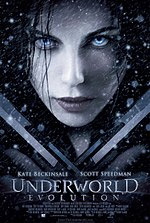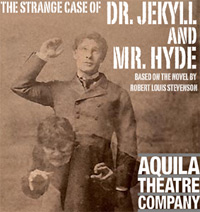
| The following reviews of new and classic genre movies, television series or tv-movies, books and magazines, comic books and graphic novels, video and dvd releases, cds and cd-roms, and internet sites, were written by members of this club during the years 2003 to present. If you are a member of Star Base Andromeda and would like to submit a review for consideration for this website, please contact us at the club's official e-mail account. Opinions expressed in the reviews on this website are solely those of the individual reviewer, and do not reflect the views of the membership of Star Base Andromeda as an organization. | |
|
|
| |
BOOKS |
| |
MOVIES |
Underworld Evolution [2006] |
-- reviewed by Scott Clark |
 *** THIS REVIEW DOES NOT CONTAIN SPOILERS *** *** THIS REVIEW DOES NOT CONTAIN SPOILERS ***Underworld Evolution Following on the heels of the very successful limited-budget, high-concept Underworld [2003], this sequel manages to equal the original in visual appeal and story content, as well as layer on even more action. Many of the primary cast return -- Kate Beckinsale is extraordinary as Selene, the vampire assassin, while Scott Speedman does a passable job as Michael Corvin, the first hybrid Vampire/Werewolf mix. New to the cast for this second go-round are Tony Curran as Marcus, the first Vampire, and Sir Derek Jacobi as the immortal father to both Marcus and William (the first werewolf). Where the first Underworld film was a rock-em, sock-em vampires vs. werewolfs thriller with a Romeo and Juliet romance caught in the middle, Underworld Evolution has a bit more story to tell. It explores the backstory of the origins of both Vampires and Werewolves in this world, and the fatally misguided quest of Marcus to have his bloodthirsty brothere William released from a timeless imprisonment. Beckinsale truly holds this film together -- without her, it wouldn't be half as enjoyable to watch. And, speaking as a red-blooded American male, Selene is an incredible figure to watch -- the black leather assassins gear she wears merely accentuates her fabulous physicality. And it's obvious she trained extensively in the fighting arts to prepare for this part. Jakobi lends a serious bit of gravitas, providing a patriarchal figure to not only his errant sons, but also to Selene, his choice to be the one who can bring peace to the Vampire/Werewolf conflict. And finally, Curran has a wonderful time chewing up scenery as Marcus, the hot-headed vampire out to save his brother. This film definitely expands upon the mythology that began in its predecessor, and the world it creates is a visual feast. The film is all dark hues -- blues, blacks, purples -- which works in the favor of the set designers, costumers and make-up artists. Director Wiseman has commented that his special effects budget was much smaller than the big blockbuster films, but you'd never know it -- the effects work is spectacular, especially when Marcus transforms from his human appearance to his ancient, monstrous Vampire form. The stunt work is particularly impressive as well. All in all, it isn't the most incredibly literate film to come down the pike, but it does have interesting characters, good dialogue, impressive visuals, a decent story that holds together fairly wello, and the hottest vampire killer since Buffy. I do recommend it, and especially recommend seeing it on the big screen -- I've seen the original now on television, and its visuals definitely suffer on the small screen! |
|
-- posted 0602.20 |
|
| |
THE THEATER |
The Strange Case of Dr. Jekyll and Mr. Hyde [2006] |
-- reviewed by Scott Clark |
 *** THIS REVIEW CONTAINS SPOILERS *** *** THIS REVIEW CONTAINS SPOILERS ***The Strange Case of Dr. Jekyll and Mr. Hyde On Tuesday, March 21st, 2006, Becky and I had the pleasure of attending a performance at the Lied Center for the Performing Arts on the UN-L campus. The production was The Strange Case of Dr. Jekyll & Mr. Hyde, performed by The Aquila Theatre Company, out of New York City. This staged version, based on the classic horror novel by Robert Louis Stevenson, is not a straight-forward adaptation but instead, with additional material by Louis Butelli, is both a fictionalized "true-crime" story and a play-within-a-play. This version is the story of egotistical American actor Richard Mansfield, who in 1888 actually did appear in a staged version of "The Strange Case of Dr. Jekyll and Mr. Hyde" on the West End in London. Mansfield's production was being performed at the same time as the infamous Jack the Ripper murders were being committed in nearby Whitechapel. Mansfield's incredible transformation into the diabolical Mr. Hyde on stage, combined with the coincidental timing of his presence in London -- his play opened just as the real-life killings began -- led to Mansfield becoming one of the primary suspects in the Ripper killings. The Aquila Theatre Company's production tells the story of actor Mansfield and the other actors, producers, writers and stagehands, attempting to put on their production of "The Strange Case of Dr. Jekyll & Mr. Hyde" in an increasing atmosphere of audience hysteria and police suspicion. In addition to Richard Sheridan Willis as Mansfield/Jekyll/Hyde, the other primary cast members are Andy Paterson as Sir Danvers Carew/Inspector Abberline, Emily Bennett as Agnes Carew, Natasha Schwartz as Mrs. Lanyon/Kate Eddowes, Andrew Schwartz as Utterson/Willis, Darren Ryan as Dr. Lanyon/Inspector Spratling, Daniel Marmion as Russell Sullivan, and Jay Painter as "Bram Stoker" the theater's stage manager. The performances in the play are strong throughout, with several standouts. Richard Sheridan Willis makes or breaks the play with his central role as Mansfield, and although it was perhaps a bit too manic and "stagey" for my tastes at times, he still pulled off the role admirably. For me, his weakest element was in the section where Mansfield withdraws to the streets of London and can't perform...done a bit too broadly or melodramatically for me. Daniel Marmion brings a realistic mixture of Peter MacNichol nebbish and Gene Wilder panicky underling to his excellent performance as the playwright Sullivan. And tremendous comic relief is provided by Jay Painter as an over-the-top stage manager Bram Stoker (tall, bald, and played more as the rat-like Renfeld), and Andy Paterson and Darren Ryan as the two police inspectors hot on Mansfield's trail. The scene of the two of them, undercover in drag, in the streets of Whitechapel, is hilarious. The play, itself, is rather uneven but holds together well enough to feel satisfying by the end. The simple, easily maneuvered set design was very effective, flipping between "backstage" and "on-stage" views very well. Costumes, lighting and sound design were all well done. The choice to have Mansfield in his "stage" make-up as Hyde throughout the show seemed questionable to me -- it stuck out awkwardly in the time when Mansfield is off-stage and not "performing". I would've preferred to see the actor portraying Mansfield/Jekyll/Hyde pull off the transformation between characters without the heavy, gaudy appearance. All in all, this was an enjoyable performance, played out be a talented troupe of actors. The capper was the short end narration by "Stoker," who recounts the fact that Mansfield remains one of the primary suspects in the unsolved Ripper killings, which both began and ended during the period he was in London. Although this play was performed with the attitude that Mansfield was not the killer, enough ambiguity remains even in this production, to make you stop and wonder. I was sorry to see such a small turnout for the performance at Lincoln's Lied Center. I recommend catching a performance of the Aquila Theatre Company's version of The Strange Case of Dr. Jekyll & Mr. Hyde, if it comes to a theater near you! |
|
-- posted 0603.24 |
|
| Last updated on 11-21-2008 |